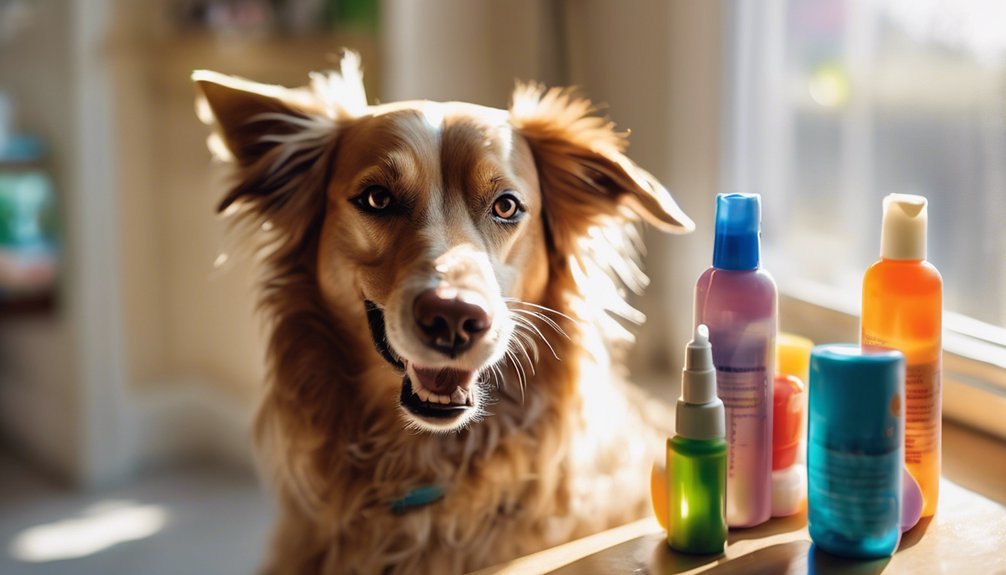
You might not realize how closely your pet's dental health affects their coat condition. Poor oral hygiene can lead to bacterial infections that impact not just their mouth, but also their skin and fur. As a responsible pet owner, understanding this connection is crucial for maintaining your companion's overall well-being. Discover how simple dental practices can contribute to a healthier, shinier coat and what signs to look out for in your pet's dental care routine.
Key Takeaways
- Regular dental care reduces dental bacteria, preventing systemic issues that can negatively impact coat health.
- A healthy mouth promotes a vibrant and shiny coat, reducing shedding and dullness.
- Dental problems like gingivitis can lead to overall health decline, affecting coat condition.
- Routine tooth brushing and dental treats support oral health, enhancing the pet's appearance.
- Early intervention for dental issues helps maintain both dental and coat health.
Understanding the Link Between Dental Health and Coat Condition

While you may not immediately connect dental health to your pet's coat condition, the two are intricately related.
Dental bacteria can enter your pet's bloodstream, leading to systemic issues that may affect their overall health, including their skin and coat. When your pet's body battles these infections, it can result in increased coat shedding and dullness.
A healthy mouth means fewer dental bacteria, which can help maintain vibrant fur and reduce shedding. Regular dental care not only keeps your pet's teeth and gums healthy but also supports their coat's luster.
Common Dental Issues in Pets
Dental issues are common among pets and can significantly impact their overall health. One prevalent concern is gingivitis, where you might notice symptoms like swelling, redness, or bleeding in your pet's gums.
If left untreated, it can progress into periodontal disease, leading to more severe complications such as tooth loss and infections. You may also observe bad breath or difficulty eating, which can indicate underlying dental problems.
It's vital to address these issues early to prevent further health decline. Regular dental check-ups and at-home care can help you maintain your furry friend's oral health.
Signs of Dental Problems to Watch For

Ignoring the signs of dental problems can lead to serious health issues for your pet. It's crucial to stay vigilant for warning signs such as bad breath, swollen gums, and changes in eating habits. These indicators can signal underlying dental issues that need immediate attention.
| Sign | Description | Action Needed |
|---|---|---|
| Bad Breath | Persistent foul odor from the mouth | Schedule a dental check-up |
| Swollen Gums | Red, inflamed gums around teeth | Consult your veterinarian |
| Difficulty Eating | Reluctance to chew or eat normally | Assess for dental pain |
| Excessive Drooling | Unusual saliva production | Seek professional advice |
The Impact of Poor Dental Hygiene on Overall Health
When you overlook your pet's dental hygiene, the consequences can extend beyond just their oral health.
Poor dental care allows dental bacteria to flourish, leading to periodontal disease that can have systemic effects on your furry friend. These bacteria can enter the bloodstream, potentially affecting vital organs like the heart, liver, and kidneys.
You might notice that your pet's overall energy levels decline, or they could develop other health issues due to this silent threat. By neglecting their dental hygiene, you're inadvertently risking their overall well-being.
It's crucial to stay proactive, ensuring your pet enjoys not just a healthy mouth, but also a vibrant, happy life. Your bond with them deserves that level of care and attention.
Dental Care Practices for Your Pet

Maintaining your pet's dental health is a fundamental aspect of their overall well-being. Regular tooth brushing is one of the best practices you can adopt. Aim to brush your pet's teeth several times a week, using a toothpaste specifically formulated for animals. This not only helps remove plaque but also strengthens your bond through shared routines.
In addition to brushing, consider incorporating dental treats into your pet's diet. These treats are designed to promote oral health by reducing tartar buildup and freshening breath. Look for options approved by veterinary organizations to ensure effectiveness.
Professional Dental Cleanings: When and Why
While regular at-home dental care is crucial, professional dental cleanings are essential for ensuring your pet's oral health.
These cleanings should ideally occur every six months, although frequency recommendations can vary based on your pet's age, breed, and dental condition.
During these appointments, veterinarians utilize specialized cleaning techniques to remove tartar and plaque that you may not reach with a toothbrush at home.
This deep cleaning helps prevent periodontal disease, which can significantly impact not only oral health but overall well-being.
Establishing a routine for professional cleanings fosters a strong bond between you and your pet, ensuring they lead a healthier, happier life.
Prioritize their dental visits to support their coat health and overall vitality.
Maintaining a Healthy Coat Through Proper Nutrition and Care

A pet's coat reflects its overall health, and proper nutrition and care play a vital role in maintaining that luster. To foster a healthy coat, consider incorporating nutritional supplements that support skin and fur vitality. Additionally, regular grooming techniques, like brushing and bathing, remove dirt and dead hair, promoting a shiny appearance.
| Nutritional Supplements | Grooming Techniques | Benefits |
|---|---|---|
| Omega-3 Fatty Acids | Daily Brushing | Reduces Shedding |
| Biotin | Regular Baths | Enhances Shine |
| Zinc | Professional Grooming | Prevents Matting |
Frequently Asked Questions
How Often Should I Brush My Pet's Teeth?
You should brush your pet's teeth daily, using a soft-bristled toothbrush appropriate for their size. Employ gentle brushing techniques, focusing on gum lines, to ensure effective cleaning and maintain their overall dental health.
Can Dental Chews Replace Regular Tooth Brushing?
Think of dental chews like a quick snack; they can't replace regular brushing. While they support dental health, their effectiveness varies. For optimal pet dental care, combine them with consistent brushing and other dental alternatives.
Are Certain Breeds More Prone to Dental Issues?
Yes, certain breeds do have breed-specific risks for dental disease prevalence. Small breeds often suffer more due to overcrowded teeth, while larger breeds can face different issues. Regular care helps mitigate these risks for your pet.
What Natural Remedies Can Help Improve Dental Health?
You can improve dental health by using herbal rinses to reduce bacteria and applying coconut oil as a natural antimicrobial. These remedies support oral hygiene while nurturing your pet's overall well-being and comfort.
How Does Stress Affect My Pet's Dental Hygiene?
Stress triggers a rise in oral bacteria, which can lead to dental issues in your pet. When they're anxious, their immune system weakens, making them more susceptible to infections and other dental hygiene problems.
Conclusion
In conclusion, prioritizing your pet's dental health isn't just about fresh breath; it's a crucial step in ensuring a vibrant coat and overall well-being. Just like a knight wouldn't head into battle without armor, you shouldn't overlook the importance of regular dental care. By staying proactive with brushing, dental treats, and veterinary check-ups, you can help your furry companion shine both inside and out. Remember, a healthy mouth equals a happy, healthy pet!





